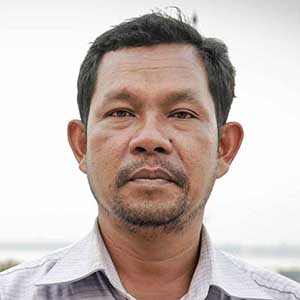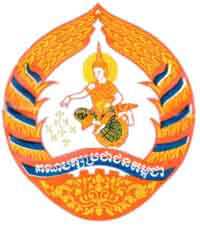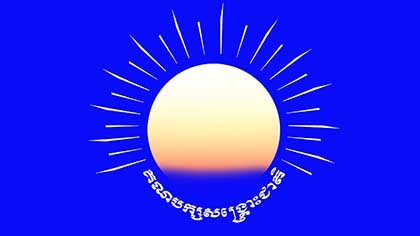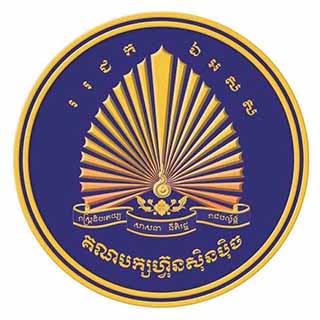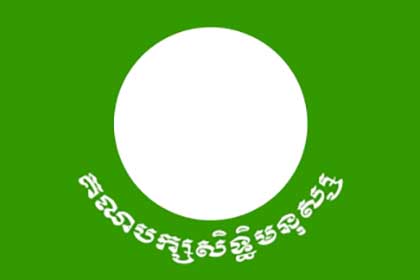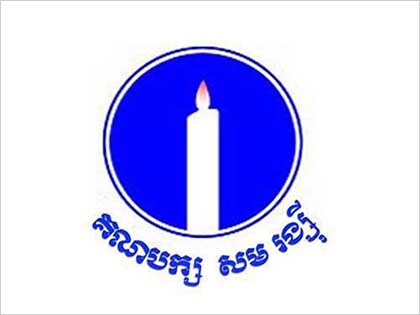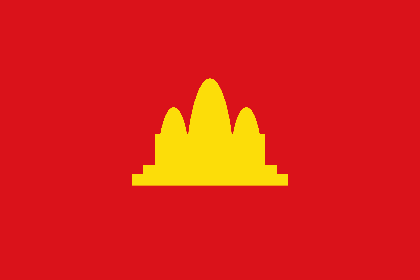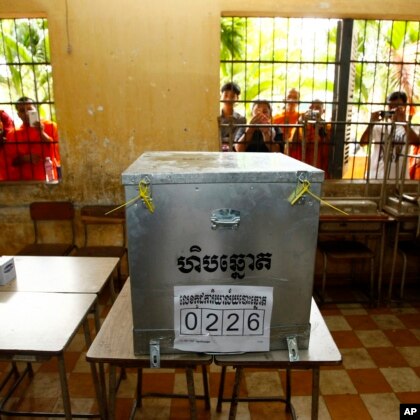
Young men took photos of a ballot box at a polling station in Phnom Penh, July 2013 during Cambodia’s last national election. (Heng Sinith | AP)
Election 2018
Cambodia Adrift
Having dissolved the main opposition party, Cambodia’s ruling party faces certain victory in a July 29 national election even as its crackdown on dissent continues.
EDITOR’S NOTE: This story was published before the 2018 election, when the results appeared certain but the future of Cambodia was in doubt. We've annotated the original story based on the election results.
The international community condemned the results.
Japan called them ‘disappointing.’
The U.S. called for sanctions on four Cambodians profiteering from the anti-democratic crackdown.
On July 29, the Cambodian government will hold the nation’s sixth general election to elect representatives for the National Assembly. International entities have spent billions of dollars funding pro-democracy civil society efforts over the past 25 years. Yet the vote has been deemed the most unfair and unfree since the United Nations organized the first post-genocide election in 1993. The government, headed by Prime Minister Hun Sen, who has been in power since 1985, believes otherwise.
Soon after the polls closed on Sunday, July 29, the CPP said it had won all 125 seats in the general election.
There’s little doubt of the outcome – Hun Sen’s Cambodian People’s Party (CPP) will win. The government dissolved the primary engine of opposition, the Cambodia National Rescue Party (CNRP) in November, and has increased its surveillance of citizens while muzzling the press. And, with its embrace of China as an ally and donor, even though it’s not much of an export market, Cambodia is drifting off the course to democracy into authoritarianism.
The election results set Cambodia on course to become a one-party state.
There are 20 parties registered for the July vote, which “shows a multiparty democracy,” said Dim Sovannarom, spokesman for Cambodia’s National Election Committee (NEC) at a May 15 news briefing. But no credible domestic election observers are registered to monitor the balloting, which is turning into a referendum on the legitimacy of the vote and a gauge of opposition to Hun Sen based on voter participation after the CNRP’s exiled leadership called for a boycott, #CleanFinger, referring to the practice of voting by an inked index finger.
Cambodia’s National Election Committee figures that nearly 7 million voters, or 82.89 percent of the electorate, turned out to vote.
The threat of a boycott rattles the government. “It’s your personal rights to exercise to not vote, but if you incite and lead people to boycott the vote, it is an action violating the law,” said Suos Yara, a CPP spokesperson who also represents Preah Vihear province.
Opposition supporters have reported intimidation from local authorities who are threatening to cut off basic public services if they boycott the vote.
The intimidation continued right up to the vote, according to some Cambodians.
“People are under a lot of pressure to vote. That’s why we need to have the #CleanFinger campaign so people can mobilize forces and feel confident about not going to vote,” the CNRP’s Mu Sochua said.

An election official shows a ballot paper as votes are counted at a polling station in Phnom Penh, July 28, 2013. (Samrang Pring | Reuters)
In the last national election, almost 3 million out of 6.6 million valid votes were cast for the CNRP. If the turnout this July is less than that 2013, it could raise a question of the new government’s legitimacy, which explains why the ruling CPP is so keen to discredit the CNRP call for a boycott.
Doubts remain about how many people voted. Bun Ly, a tour guide in Siem Reap, said “the voter turnout figures is a surprise for me. Based on my observations, it was not as much.”
“If the CPP manages to secure a high enough voter turnout, this will be used to legitimize the authoritarian turn,” said Astrid Norén-Nilsson, an associate senior lecturer at the Center for East and South-East Asian Studies at Lund University in Sweden.
“It is easy to dismiss democracy as a foreign concept in Cambodia,” Norén-Nilsson said. “But democracy has long been a key concept in Cambodian political thought, for which each single political regime in Cambodia, ever since independence, [1953] has offered vivid though starkly different interpretations. Probably for that reason, an ideal of democracy is very alive in Cambodia, even though there is no agreement even on the basics of what democracy means.
“The government cares immensely about the elections,” she continued. “This seems counterintuitive, given that the government’s critics have already been shut down, but it is an indication of how strongly rooted multiparty elections have become in Cambodia and signals that these will remain important even in the absence of real contenders to the CPP.”
Or, as exiled CNRP official Mu Sochua told VOA Khmer, “I strongly believe that the electorate will have a chance to take part in a democratic electoral process, if not now, in the near future.”
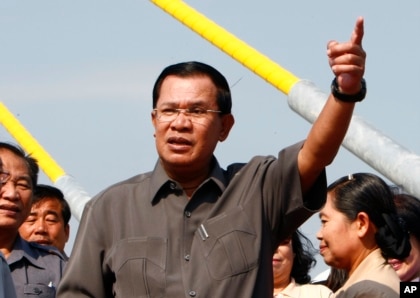
Cambodian Prime Minister Hun Sen, delivering a speech in Phnom Penh in 2015. (Heng Sinith | AP)
‘Peace First’
Hun Sen, who vows to rule the country at least 10 more years, has been on a “Peace First” campaign, much like U.S. President Donald Trump’s “America First” efforts, since early March.
For many in Cambodia, peace and the stability it brings are far from boilerplate campaign promises. After enduring the Khmer Rouge, a regime 1975 to 1979 systematically ruined the economy, caused the deaths of at least 1.7 million people, and forced millions more into brutal slave-labor camps, the nation survived 10 years of civil war.
Issues such as health care, education, a lack of clean water, electricity and paved roads, environmental degradation, illegal land grabs, and growing social disparities carry more weight with rural voters – the biggest voting cohort – than international concern that Cambodia is backsliding on the road to democracy by cracking down on the press and civil society institutions.
“Peace and stability are primarily the biggest things,” said Suos Yara, the CPP spokesperson. “Without them, democracy can never be strong. A real democracy is in line with the laws of … Cambodia. No conspiracy with any foreigners.”
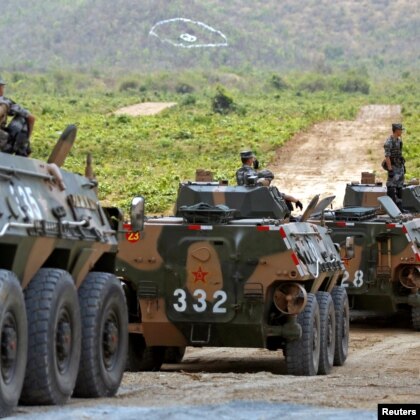
Chinese soldiers sit on their tanks as they attend the opening of military exercise in Kampong Speu province, Cambodia, on March 17, 2018. Hundreds of soldiers participated in a 15-day joint Cambodia-China military exercise. (Reuters)
Outside forces
Foreigners have long played a role in Cambodia’s governments, most recently in the post-Khmer Rouge rebuilding efforts that began in 1991, after the signing of the Paris Peace Accords ended the civil war. Western aid flooded in to fund projects that would help Cambodia reinvent itself as a democracy.
Hun Sen has turned from that cash flow, which was often linked to the ideals of liberal democracy such as freedom of assembly, a free press and transparency in government, to accept aid from China which continues to throw billion of dollars in aid and loans to Cambodia. More than two-thirds of Cambodia’s $4.3 billion in bilateral debt is owed to China, according to the International Monetary Fund.
Indeed, China keeps expressing its support for Hun Sen even as the European Union and the U.S. have cut funding since the CNRP was dissolved.
China endorsed the election results.
But Cambodia’s economy relies on exports, $18.4 billion worth in 2016, according to the Observatory of Economic Complexity (OEC). The United States buys 17 percent of Cambodia’s exports, which are worth $3.19 billion. China buys 4.7 percent, worth $866 million. And, under a preferential access scheme, Cambodia’s exports to European Union markets totaled $5.25 billion in 2016, according to OEC data, suggesting that the Cambodian government would pay dearly if the EU terminated its Everything But Arms scheme.
Today, as Cambodia’s economy continues to grow at one of the fastest rates in Southeast Asia region, “people keep voting for us,” said Suos Yara, of the victories won by Hun Sen and the CPP in every national election since 1998. “CPP is the party with history of national liberation, with history of national unification, bringing and protecting peace, stability and economic growth.”
It is also the party of Hun Sen, who will continue to be prime minister after July 29, heading into another decade of power.
“Basically, after tens of billions of dollars invested in Cambodia, we’re back where we were 25 years ago,” said Sophal Ear, author of “Aid Dependence in Cambodia: How Foreign Assistance Undermines Democracy,” out in September. “The more things changed, the more they actually stayed the same.”

